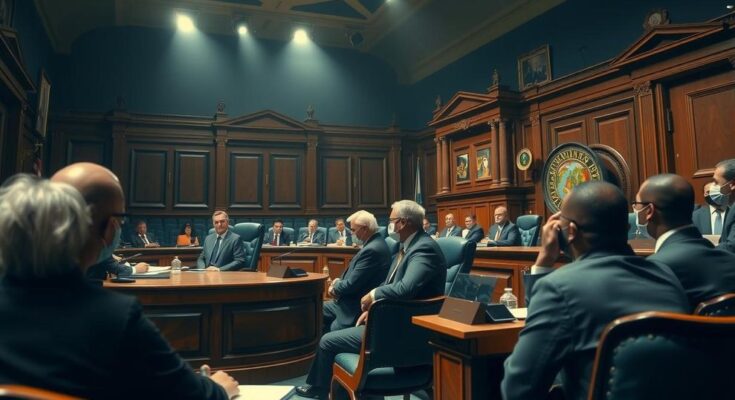Representatives from vulnerable nations urged the International Court of Justice (ICJ) to hold a small number of countries accountable for their disproportionate greenhouse gas emissions. Vanuatu’s special envoy emphasized the severe impacts of climate change on Pacific island nations. The court will hear statements from various nations regarding their obligations to combat climate change, aiming to clarify responsibilities and potential reparations.
A group of representatives from vulnerable nations has urged the International Court of Justice (ICJ) to hold a small number of countries legally accountable for their significant contributions to climate change. At a pivotal hearing in The Hague, Vanuatu’s special envoy for climate, Ralph Regenvanu, emphasized that the responsibility for the climate crisis lies predominantly with a select group of states that have caused the bulk of greenhouse gas emissions while suffering the least from its consequences. Pacific island nations, including Vanuatu, have been severely impacted by rising sea levels and catastrophic weather events, illustrating the urgent need for accountability.
The proceedings, which have garnered international attention, stem from years of advocacy led by Vanuatu, backed by the UN General Assembly’s resolution calling for an ICJ advisory opinion regarding state obligations in combatting climate change. Over the forthcoming weeks, the court will hear from 98 nations, including significant historical emitters such as the UK and Russia, alongside countries that contribute minimal emissions but are adversely affected, including Bangladesh and Sudan.
Throughout the hearing, experts will present evidence, including testimonies from individuals suffering the direct effects of climate change. Legal representatives, including Ilan Kiloe from the Melanesian Spearhead Group, articulated the dire dangers that climate change poses to their populations, stating the potential extinction of their communities. Moreover, Margaretha Wewerinke-Singh, representing Vanuatu’s interests, asserted that many states are in violation of international law due to their fossil fuel practices and failure to regulate emissions effectively.
Cynthia Houniuhi, a youth advocate, emphasized the disillusionment from young generations with climate accords like the Paris Agreement, arguing that they have been compromised by fossil fuel priorities. Various organizations, including the OPEC and WHO, will also provide statements before the ICJ, which is one of three international courts examining the legal dimensions of climate change. The ICJ’s ruling, while non-binding, will carry significant weight in global climate policy discussions and future legal actions.
The hearing commenced with an opening ceremony featuring political addresses and cultural performances from Pacific island artists, underscoring the importance of this issue for vulnerable nations. Houniuhi poignantly concluded, reminding the court that their ruling could lead to monumental changes in addressing climate change, urging them to apply international law judiciously to rectify the actions contributing to this global crisis.
The International Court of Justice (ICJ) serves as the principal judicial body of the United Nations, tasked with resolving legal disputes submitted by states and providing advisory opinions on matters of international law. The current hearings focus on the recognition of climate change as a global crisis with profound implications for vulnerable nations, particularly those in the Pacific, which are disproportionately affected yet bear minimal responsibility for greenhouse gas emissions. This case highlights the emerging calls for legal accountability among the principal emitters of greenhouse gases, alongside the necessity for concerted international efforts to mitigate climate change impacts through adherence to established legal frameworks.
The ongoing hearings at the ICJ represent a pivotal moment in addressing the climate crisis, with vulnerable nations seeking legal accountability from countries that have contributed significantly to greenhouse gas emissions. The testimonies and evidence presented in court underscore the urgent need for action and reparations to mitigate the impacts on those disproportionately affected. As the world faces an existential threat due to climate change, the court’s advisory opinion could pave the way for stronger international commitments and accountability measures.
Original Source: www.theguardian.com




